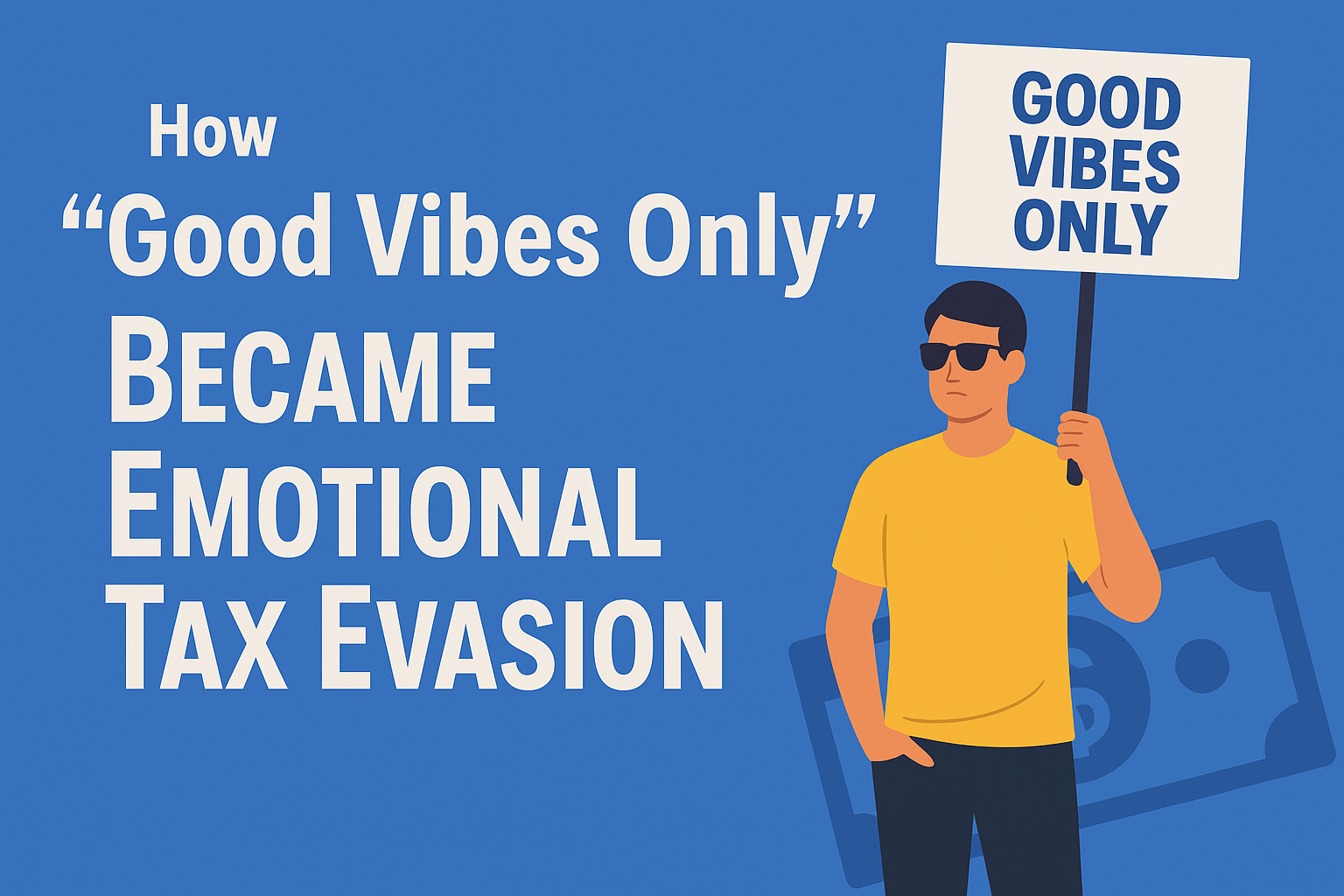How dodging discomfort leaves others footing the emotional bill

Your friend just got canned. They're sitting across from you, shell-shocked, when you—bless your optimistic heart—decide to help: "Good vibes only! Everything happens for a reason!"
Congratulations. You've just committed emotional tax evasion.
Like the wealthy individual who stashes money offshore while public schools crumble, the "Good Vibes Only" evangelist dodges their emotional obligations and leaves everyone else to pick up the tab. Your dismissed friend carries their unprocessed grief home. Their overwhelmed partner snaps at the kids. The kids act out at school. The teacher goes home cranky.
You? You get to keep your hands clean, convinced you spread sunshine while everyone else pays the bill.
The Cheerfulness Ponzi Scheme
Toxic positivity isn't misguided optimism—it's sophisticated avoidance masquerading as kindness. You know those "no drama" people who somehow orbit the eye of every emotional hurricane? Same energy.
The math is brutal: Refuse to engage with difficult emotions, and they don't disappear. They redistribute. Friends become unpaid therapists. Colleagues absorb your unprocessed anxiety. Partners inherit your unspoken resentments. It's an emotional gig economy where everyone works for free except the person creating the mess.
Consider the greatest hits: "At least you have your health!" (Translation: Your concerns make me uncomfortable.) "Just think positive thoughts!" (Translation: Your feelings inconvenience my worldview.) "Don't bring that negative energy here!" (Translation: I'm emotionally unavailable, and that's your problem.)
Each phrase sends someone's authentic experience into exile while maintaining the fiction that everything's fine. It's gaslighting with jazz hands.
The Institutional Grift
Corporate America discovered that "positive company culture" costs less than addressing systemic issues. Why fix toxic management when you can mandate gratitude journals? Why improve working conditions when you can hire a motivational speaker to explain that burnout is a mindset problem?
Teams mistake silence for harmony. Mistakes become attitude problems. Genuine concerns transform into insubordination. Innovation suffocates—not from lack of creativity, but from the terror that any critique will be labelled "negative." The actual problems compound like unpaid debt until they explode in ways no amount of positive thinking can contain.
Politically, the damage runs deeper. "Good vibes only" becomes oppression disguised as enlightenment. Tell marginalized communities to "focus on the positive" while systems grind them down. Suggest that acknowledging injustice somehow creates it. It's spiritual bypassing for the "thoughts and prayers" crowd—except what you're not allowed to say is "I'm experiencing discrimination" or "This system is broken."
The Psychology of Emotional Bankruptcy
Why do otherwise decent humans become emotional tax evaders? Same reason people use offshore accounts: It feels easier in the short term, and consequences seem distant.
We live in a culture that gamifies happiness. Social media turned joy into performance art. Everyone's life became a highlight reel that makes your Tuesday feel like personal failure. The pressure to maintain emotional solvency—to always be "blessed," "grateful," "living my best life"—creates a debt spiral where admitting struggle feels like admitting defeat.
And this: Negative emotions are genuinely uncomfortable. They demand we sit with uncertainty, tolerate ambiguity, and accept that some problems can't be solved with the right attitude. "Good vibes only" offers the illusion of control. Maintain the right mindset, and surely we can manifest our way out of layoffs, illness, and systemic inequality.
Spoiler alert: We can't. Reality demands payment, with interest.
When Positivity Becomes Tyranny
The most enthusiastic emotional tax evaders genuinely believe they're helping. They've confused optimism with oppression, hope with suppression. They're the friend who insists on picking up dinner and passive-aggressively mentions it for six months.
Real optimism is internal and resilient. It acknowledges difficulty while believing in change. Enforced positivity is external and brittle. It demands that others perform happiness for your comfort. One's a life preserver; the other's a decorative pool float that looks cheerful until you're drowning.
The most twisted part? This emotional authoritarianism comes wrapped in wellness language. "I'm just keeping the energy positive!" "Negativity is toxic!" It's having your constitutional rights violated by someone in a namaste t-shirt.
The Audit Comes Due
Suppressed emotions surface eventually—usually at the worst moment, in the least convenient way. The friend who never complains explodes over something trivial. The perpetually cheerful coworker breaks down in the supply closet. The relentlessly positive family member turns inexplicably bitter.
This is the emotional audit. All those feelings you refused to process, difficult conversations you dodged, pain you delegated—it accumulates like unpaid taxes. Eventually, someone comes collecting.
Toward Emotional Solvency
The solution isn't becoming a professional pessimist. It's accepting that humans aren't Instagram filters—we experience the full spectrum, and pretending otherwise helps nobody.
Try this: "Good vibes mostly, but real vibes always." Replace "Don't be negative" with "That sounds difficult—tell me more." Swap "Everything happens for a reason" for "I don't know why this happened, but I'm here while you figure out what's next."
We're building relationships strong enough to handle the full range—grief and joy, fear and hope, rage and love. No performance required.
Here's the twist: Emotional honesty actually creates better vibes. Not the synthetic kind that shatter at first difficulty, but the durable ones built on solid ground. Real connection happens in the messy middle where actual humans live.
When we stop evading our emotional taxes and start paying what we owe, authenticity becomes the ultimate currency. And unlike those offshore accounts? It pays actual dividends.
Next time someone shares their struggle and you feel that urge to deflect with mandatory cheerfulness, choose: Be part of the problem or part of the solution.
The interest rates on authenticity are much more reasonable.


